Technical Skills Gap: Malaysian Students and Employment Challenges
VerifiedAdded on 2022/08/08
|11
|3488
|21
Essay
AI Summary
This essay examines the critical issue of technical skill deficiencies among Malaysian students and its adverse impact on their employment opportunities. It delves into the Malaysian education system, highlighting the lack of technical skills imparted to students at various levels, from primary to tertiary education. The essay analyzes the employment landscape in Malaysia, emphasizing the growing demand for technically skilled workers and the challenges faced by Malaysian graduates who often lack the required competencies. It explores the impact of this skills gap on the country's GDP and economic growth, while also discussing the role of English language proficiency and problem-solving skills in securing employment. Furthermore, the essay suggests improvements to the education system, including integrating technical skills into the curriculum, enhancing teacher quality, and promoting extracurricular activities to foster communication and critical thinking skills. The conclusion underscores the importance of equipping Malaysian students with the necessary technical expertise to thrive in the competitive job market and contribute to the nation's economic advancement. The essay is a response to an assignment brief focusing on the extent to which Malaysian students lack technical skills and how this affects their employment prospects, as well as providing suggestions on how to improve the situation.
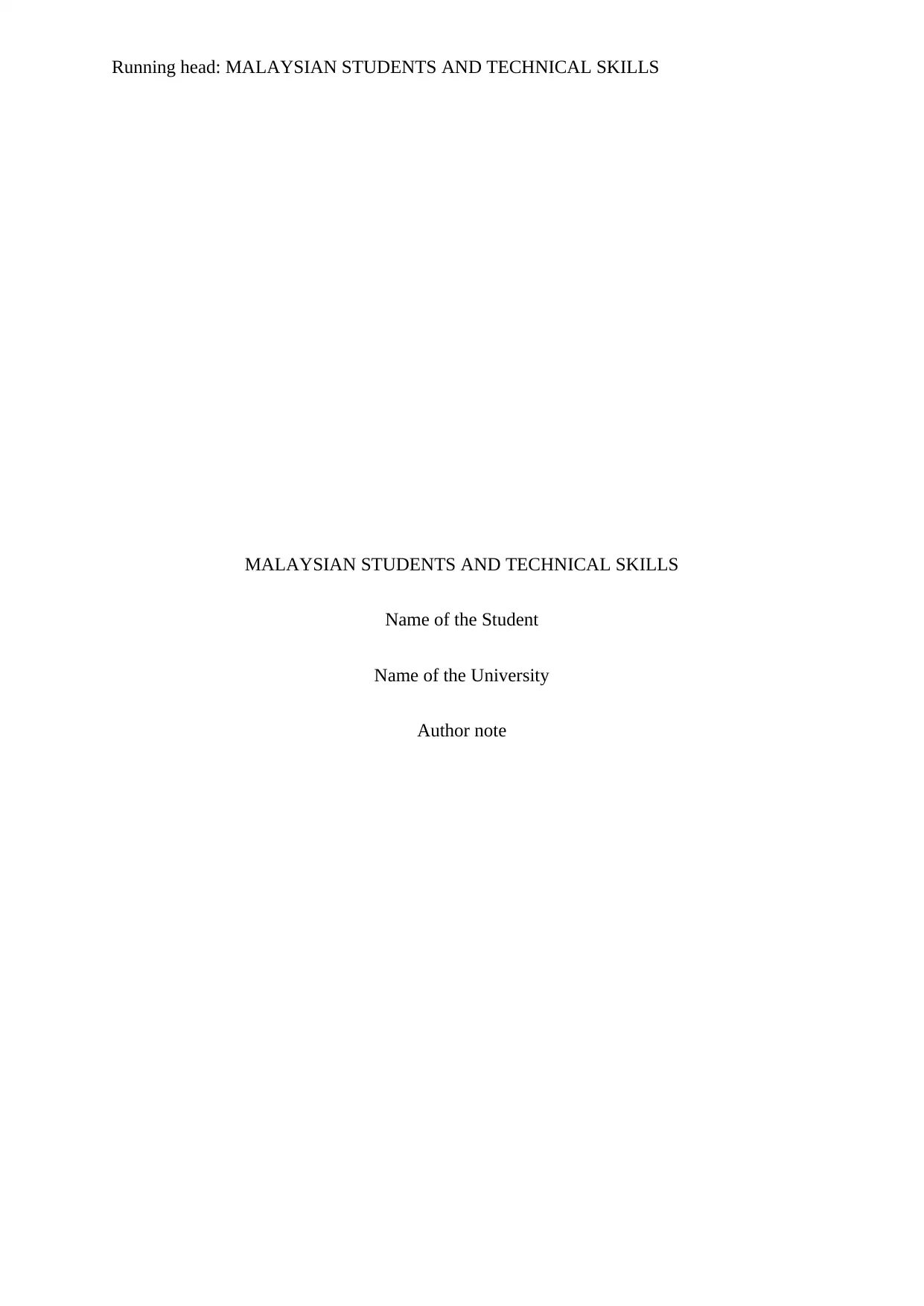
Running head: MALAYSIAN STUDENTS AND TECHNICAL SKILLS
MALAYSIAN STUDENTS AND TECHNICAL SKILLS
Name of the Student
Name of the University
Author note
MALAYSIAN STUDENTS AND TECHNICAL SKILLS
Name of the Student
Name of the University
Author note
Paraphrase This Document
Need a fresh take? Get an instant paraphrase of this document with our AI Paraphraser
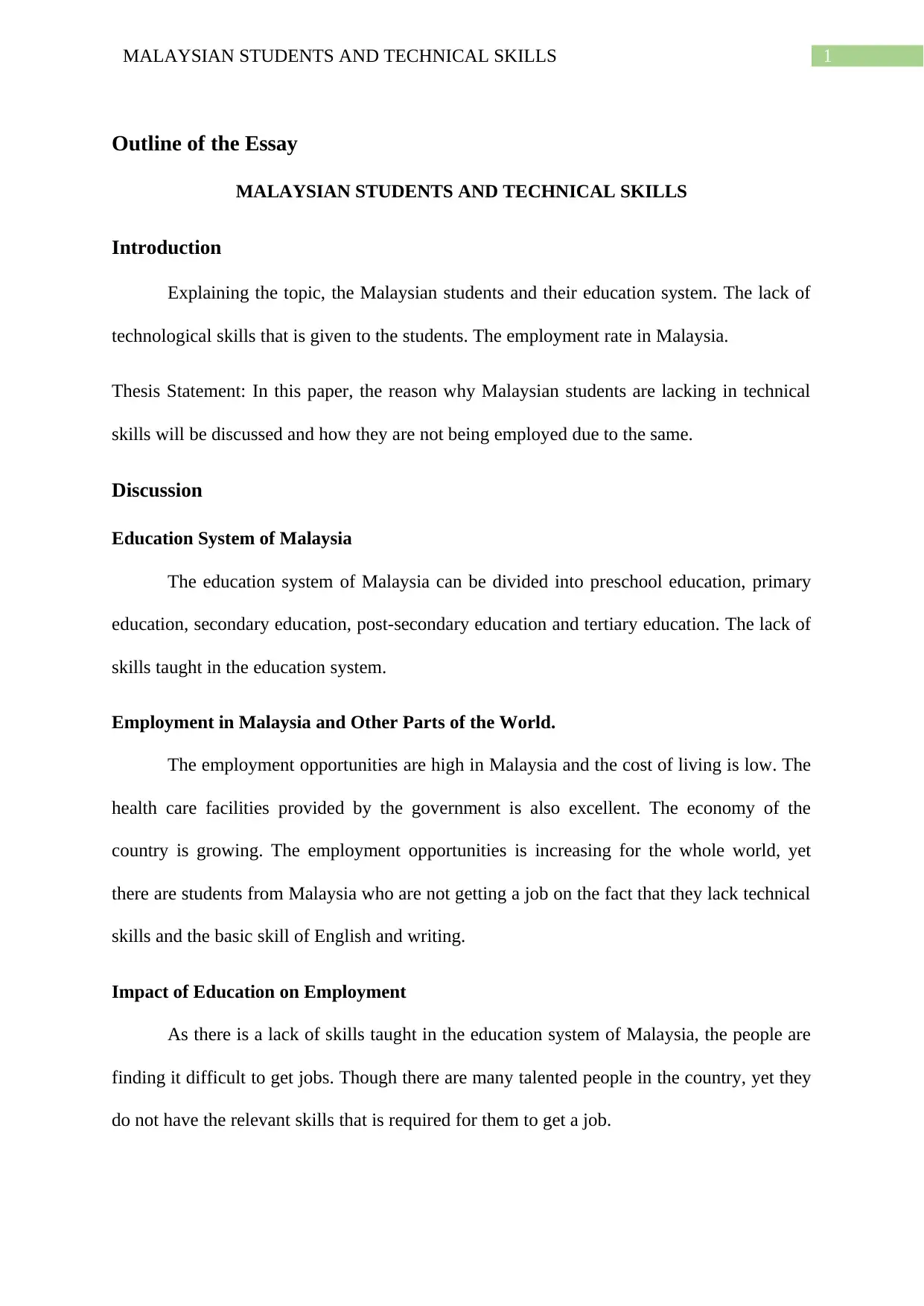
1MALAYSIAN STUDENTS AND TECHNICAL SKILLS
Outline of the Essay
MALAYSIAN STUDENTS AND TECHNICAL SKILLS
Introduction
Explaining the topic, the Malaysian students and their education system. The lack of
technological skills that is given to the students. The employment rate in Malaysia.
Thesis Statement: In this paper, the reason why Malaysian students are lacking in technical
skills will be discussed and how they are not being employed due to the same.
Discussion
Education System of Malaysia
The education system of Malaysia can be divided into preschool education, primary
education, secondary education, post-secondary education and tertiary education. The lack of
skills taught in the education system.
Employment in Malaysia and Other Parts of the World.
The employment opportunities are high in Malaysia and the cost of living is low. The
health care facilities provided by the government is also excellent. The economy of the
country is growing. The employment opportunities is increasing for the whole world, yet
there are students from Malaysia who are not getting a job on the fact that they lack technical
skills and the basic skill of English and writing.
Impact of Education on Employment
As there is a lack of skills taught in the education system of Malaysia, the people are
finding it difficult to get jobs. Though there are many talented people in the country, yet they
do not have the relevant skills that is required for them to get a job.
Outline of the Essay
MALAYSIAN STUDENTS AND TECHNICAL SKILLS
Introduction
Explaining the topic, the Malaysian students and their education system. The lack of
technological skills that is given to the students. The employment rate in Malaysia.
Thesis Statement: In this paper, the reason why Malaysian students are lacking in technical
skills will be discussed and how they are not being employed due to the same.
Discussion
Education System of Malaysia
The education system of Malaysia can be divided into preschool education, primary
education, secondary education, post-secondary education and tertiary education. The lack of
skills taught in the education system.
Employment in Malaysia and Other Parts of the World.
The employment opportunities are high in Malaysia and the cost of living is low. The
health care facilities provided by the government is also excellent. The economy of the
country is growing. The employment opportunities is increasing for the whole world, yet
there are students from Malaysia who are not getting a job on the fact that they lack technical
skills and the basic skill of English and writing.
Impact of Education on Employment
As there is a lack of skills taught in the education system of Malaysia, the people are
finding it difficult to get jobs. Though there are many talented people in the country, yet they
do not have the relevant skills that is required for them to get a job.
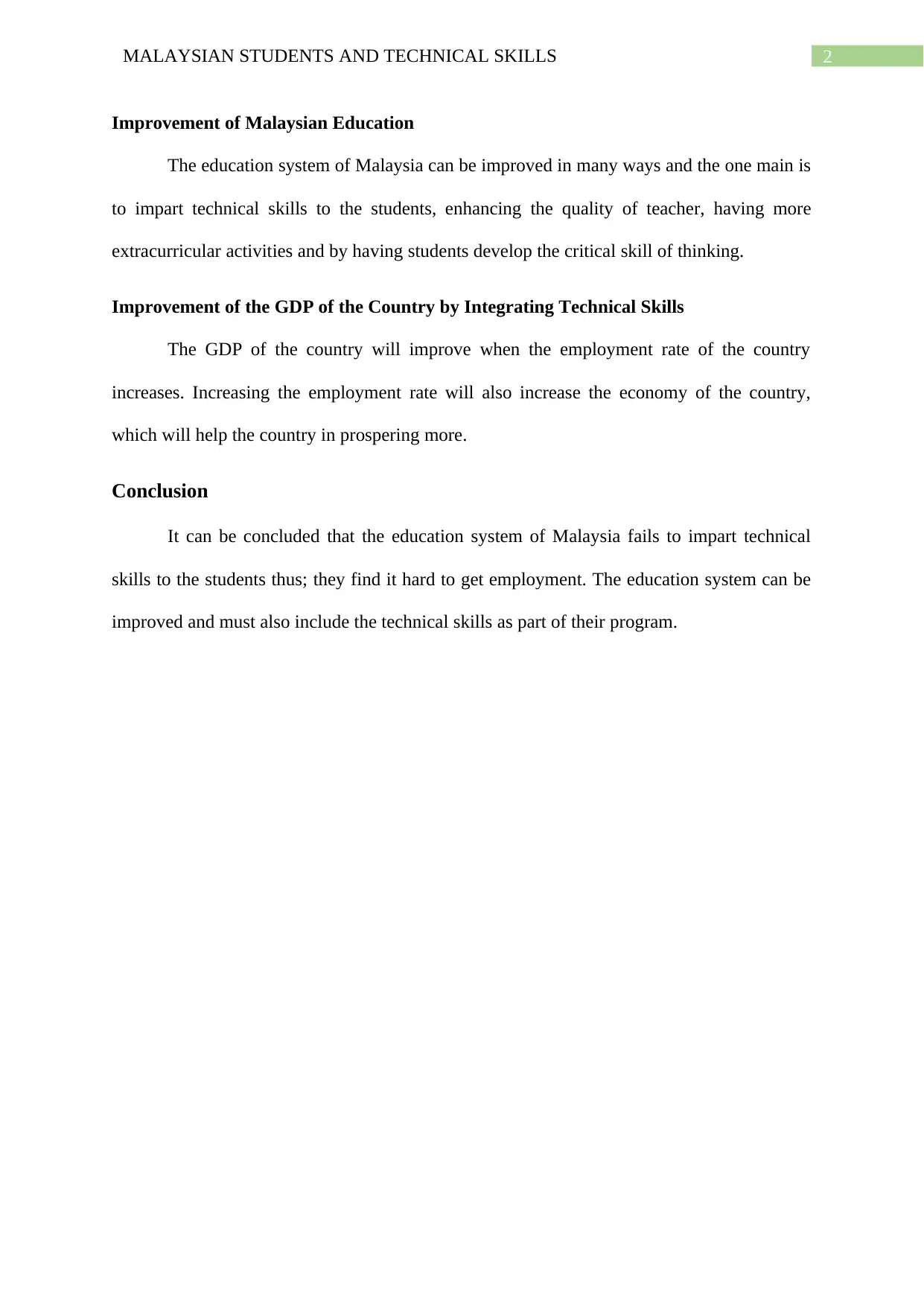
2MALAYSIAN STUDENTS AND TECHNICAL SKILLS
Improvement of Malaysian Education
The education system of Malaysia can be improved in many ways and the one main is
to impart technical skills to the students, enhancing the quality of teacher, having more
extracurricular activities and by having students develop the critical skill of thinking.
Improvement of the GDP of the Country by Integrating Technical Skills
The GDP of the country will improve when the employment rate of the country
increases. Increasing the employment rate will also increase the economy of the country,
which will help the country in prospering more.
Conclusion
It can be concluded that the education system of Malaysia fails to impart technical
skills to the students thus; they find it hard to get employment. The education system can be
improved and must also include the technical skills as part of their program.
Improvement of Malaysian Education
The education system of Malaysia can be improved in many ways and the one main is
to impart technical skills to the students, enhancing the quality of teacher, having more
extracurricular activities and by having students develop the critical skill of thinking.
Improvement of the GDP of the Country by Integrating Technical Skills
The GDP of the country will improve when the employment rate of the country
increases. Increasing the employment rate will also increase the economy of the country,
which will help the country in prospering more.
Conclusion
It can be concluded that the education system of Malaysia fails to impart technical
skills to the students thus; they find it hard to get employment. The education system can be
improved and must also include the technical skills as part of their program.
⊘ This is a preview!⊘
Do you want full access?
Subscribe today to unlock all pages.

Trusted by 1+ million students worldwide
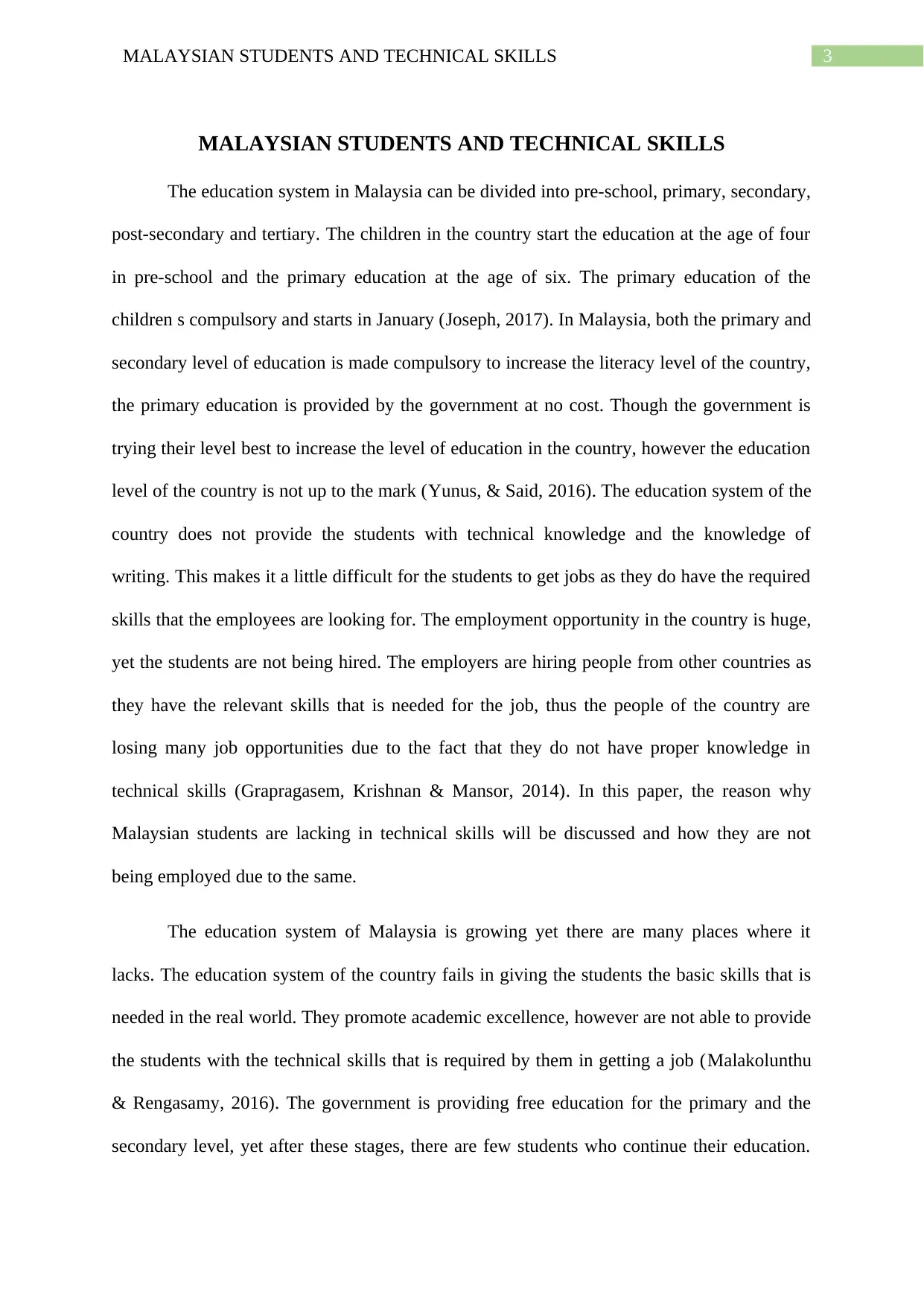
3MALAYSIAN STUDENTS AND TECHNICAL SKILLS
MALAYSIAN STUDENTS AND TECHNICAL SKILLS
The education system in Malaysia can be divided into pre-school, primary, secondary,
post-secondary and tertiary. The children in the country start the education at the age of four
in pre-school and the primary education at the age of six. The primary education of the
children s compulsory and starts in January (Joseph, 2017). In Malaysia, both the primary and
secondary level of education is made compulsory to increase the literacy level of the country,
the primary education is provided by the government at no cost. Though the government is
trying their level best to increase the level of education in the country, however the education
level of the country is not up to the mark (Yunus, & Said, 2016). The education system of the
country does not provide the students with technical knowledge and the knowledge of
writing. This makes it a little difficult for the students to get jobs as they do have the required
skills that the employees are looking for. The employment opportunity in the country is huge,
yet the students are not being hired. The employers are hiring people from other countries as
they have the relevant skills that is needed for the job, thus the people of the country are
losing many job opportunities due to the fact that they do not have proper knowledge in
technical skills (Grapragasem, Krishnan & Mansor, 2014). In this paper, the reason why
Malaysian students are lacking in technical skills will be discussed and how they are not
being employed due to the same.
The education system of Malaysia is growing yet there are many places where it
lacks. The education system of the country fails in giving the students the basic skills that is
needed in the real world. They promote academic excellence, however are not able to provide
the students with the technical skills that is required by them in getting a job (Malakolunthu
& Rengasamy, 2016). The government is providing free education for the primary and the
secondary level, yet after these stages, there are few students who continue their education.
MALAYSIAN STUDENTS AND TECHNICAL SKILLS
The education system in Malaysia can be divided into pre-school, primary, secondary,
post-secondary and tertiary. The children in the country start the education at the age of four
in pre-school and the primary education at the age of six. The primary education of the
children s compulsory and starts in January (Joseph, 2017). In Malaysia, both the primary and
secondary level of education is made compulsory to increase the literacy level of the country,
the primary education is provided by the government at no cost. Though the government is
trying their level best to increase the level of education in the country, however the education
level of the country is not up to the mark (Yunus, & Said, 2016). The education system of the
country does not provide the students with technical knowledge and the knowledge of
writing. This makes it a little difficult for the students to get jobs as they do have the required
skills that the employees are looking for. The employment opportunity in the country is huge,
yet the students are not being hired. The employers are hiring people from other countries as
they have the relevant skills that is needed for the job, thus the people of the country are
losing many job opportunities due to the fact that they do not have proper knowledge in
technical skills (Grapragasem, Krishnan & Mansor, 2014). In this paper, the reason why
Malaysian students are lacking in technical skills will be discussed and how they are not
being employed due to the same.
The education system of Malaysia is growing yet there are many places where it
lacks. The education system of the country fails in giving the students the basic skills that is
needed in the real world. They promote academic excellence, however are not able to provide
the students with the technical skills that is required by them in getting a job (Malakolunthu
& Rengasamy, 2016). The government is providing free education for the primary and the
secondary level, yet after these stages, there are few students who continue their education.
Paraphrase This Document
Need a fresh take? Get an instant paraphrase of this document with our AI Paraphraser
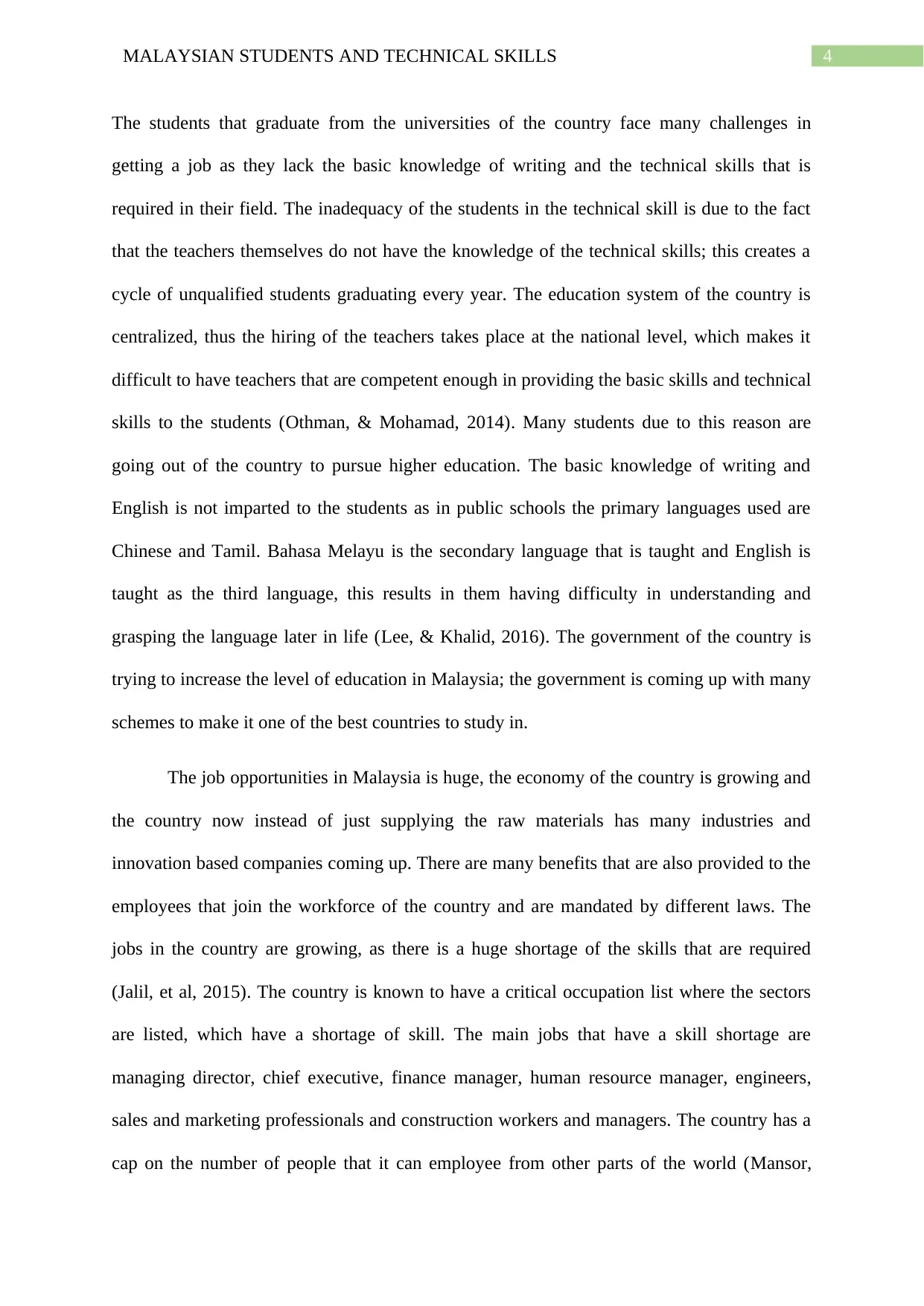
4MALAYSIAN STUDENTS AND TECHNICAL SKILLS
The students that graduate from the universities of the country face many challenges in
getting a job as they lack the basic knowledge of writing and the technical skills that is
required in their field. The inadequacy of the students in the technical skill is due to the fact
that the teachers themselves do not have the knowledge of the technical skills; this creates a
cycle of unqualified students graduating every year. The education system of the country is
centralized, thus the hiring of the teachers takes place at the national level, which makes it
difficult to have teachers that are competent enough in providing the basic skills and technical
skills to the students (Othman, & Mohamad, 2014). Many students due to this reason are
going out of the country to pursue higher education. The basic knowledge of writing and
English is not imparted to the students as in public schools the primary languages used are
Chinese and Tamil. Bahasa Melayu is the secondary language that is taught and English is
taught as the third language, this results in them having difficulty in understanding and
grasping the language later in life (Lee, & Khalid, 2016). The government of the country is
trying to increase the level of education in Malaysia; the government is coming up with many
schemes to make it one of the best countries to study in.
The job opportunities in Malaysia is huge, the economy of the country is growing and
the country now instead of just supplying the raw materials has many industries and
innovation based companies coming up. There are many benefits that are also provided to the
employees that join the workforce of the country and are mandated by different laws. The
jobs in the country are growing, as there is a huge shortage of the skills that are required
(Jalil, et al, 2015). The country is known to have a critical occupation list where the sectors
are listed, which have a shortage of skill. The main jobs that have a skill shortage are
managing director, chief executive, finance manager, human resource manager, engineers,
sales and marketing professionals and construction workers and managers. The country has a
cap on the number of people that it can employee from other parts of the world (Mansor,
The students that graduate from the universities of the country face many challenges in
getting a job as they lack the basic knowledge of writing and the technical skills that is
required in their field. The inadequacy of the students in the technical skill is due to the fact
that the teachers themselves do not have the knowledge of the technical skills; this creates a
cycle of unqualified students graduating every year. The education system of the country is
centralized, thus the hiring of the teachers takes place at the national level, which makes it
difficult to have teachers that are competent enough in providing the basic skills and technical
skills to the students (Othman, & Mohamad, 2014). Many students due to this reason are
going out of the country to pursue higher education. The basic knowledge of writing and
English is not imparted to the students as in public schools the primary languages used are
Chinese and Tamil. Bahasa Melayu is the secondary language that is taught and English is
taught as the third language, this results in them having difficulty in understanding and
grasping the language later in life (Lee, & Khalid, 2016). The government of the country is
trying to increase the level of education in Malaysia; the government is coming up with many
schemes to make it one of the best countries to study in.
The job opportunities in Malaysia is huge, the economy of the country is growing and
the country now instead of just supplying the raw materials has many industries and
innovation based companies coming up. There are many benefits that are also provided to the
employees that join the workforce of the country and are mandated by different laws. The
jobs in the country are growing, as there is a huge shortage of the skills that are required
(Jalil, et al, 2015). The country is known to have a critical occupation list where the sectors
are listed, which have a shortage of skill. The main jobs that have a skill shortage are
managing director, chief executive, finance manager, human resource manager, engineers,
sales and marketing professionals and construction workers and managers. The country has a
cap on the number of people that it can employee from other parts of the world (Mansor,
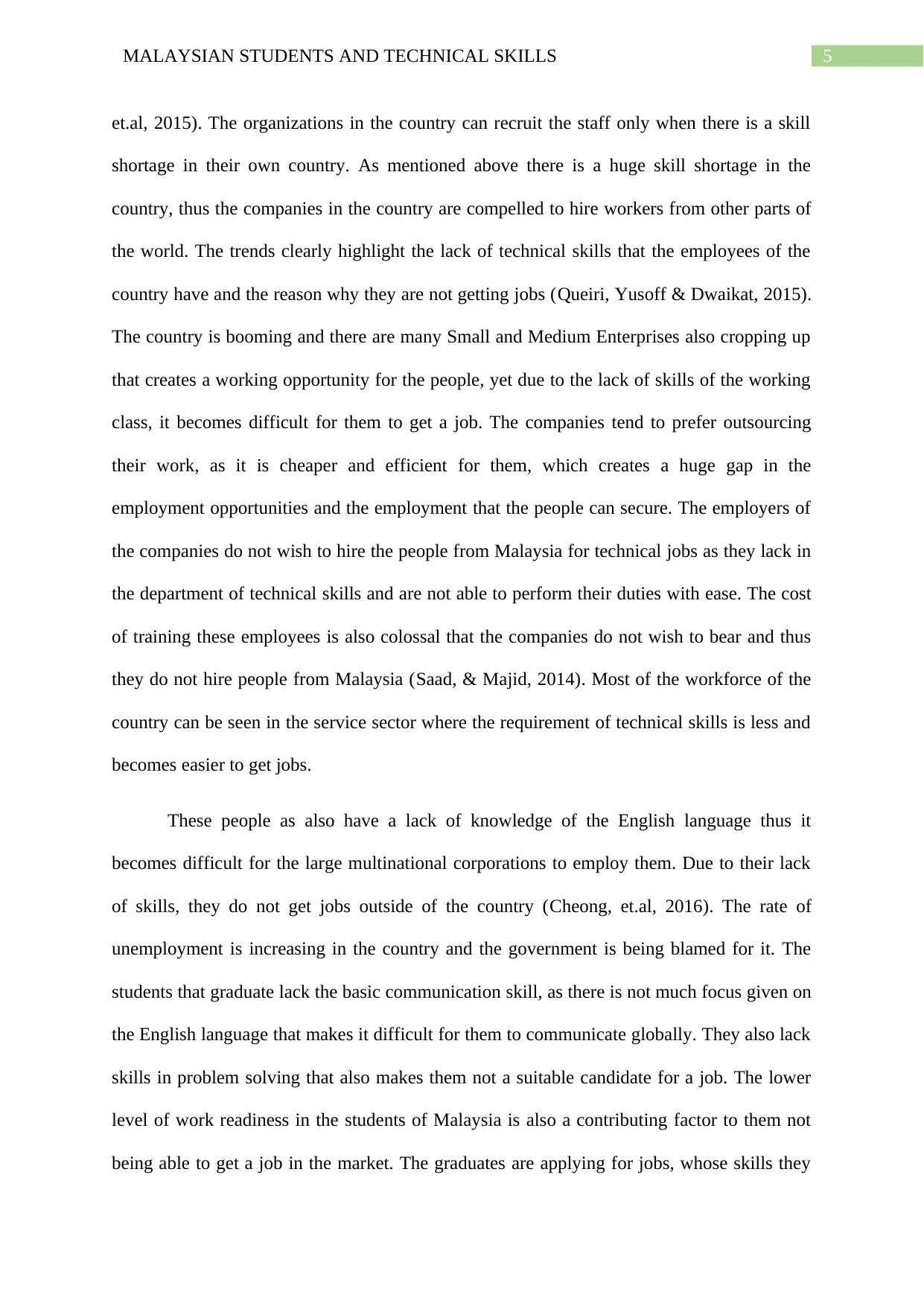
5MALAYSIAN STUDENTS AND TECHNICAL SKILLS
et.al, 2015). The organizations in the country can recruit the staff only when there is a skill
shortage in their own country. As mentioned above there is a huge skill shortage in the
country, thus the companies in the country are compelled to hire workers from other parts of
the world. The trends clearly highlight the lack of technical skills that the employees of the
country have and the reason why they are not getting jobs (Queiri, Yusoff & Dwaikat, 2015).
The country is booming and there are many Small and Medium Enterprises also cropping up
that creates a working opportunity for the people, yet due to the lack of skills of the working
class, it becomes difficult for them to get a job. The companies tend to prefer outsourcing
their work, as it is cheaper and efficient for them, which creates a huge gap in the
employment opportunities and the employment that the people can secure. The employers of
the companies do not wish to hire the people from Malaysia for technical jobs as they lack in
the department of technical skills and are not able to perform their duties with ease. The cost
of training these employees is also colossal that the companies do not wish to bear and thus
they do not hire people from Malaysia (Saad, & Majid, 2014). Most of the workforce of the
country can be seen in the service sector where the requirement of technical skills is less and
becomes easier to get jobs.
These people as also have a lack of knowledge of the English language thus it
becomes difficult for the large multinational corporations to employ them. Due to their lack
of skills, they do not get jobs outside of the country (Cheong, et.al, 2016). The rate of
unemployment is increasing in the country and the government is being blamed for it. The
students that graduate lack the basic communication skill, as there is not much focus given on
the English language that makes it difficult for them to communicate globally. They also lack
skills in problem solving that also makes them not a suitable candidate for a job. The lower
level of work readiness in the students of Malaysia is also a contributing factor to them not
being able to get a job in the market. The graduates are applying for jobs, whose skills they
et.al, 2015). The organizations in the country can recruit the staff only when there is a skill
shortage in their own country. As mentioned above there is a huge skill shortage in the
country, thus the companies in the country are compelled to hire workers from other parts of
the world. The trends clearly highlight the lack of technical skills that the employees of the
country have and the reason why they are not getting jobs (Queiri, Yusoff & Dwaikat, 2015).
The country is booming and there are many Small and Medium Enterprises also cropping up
that creates a working opportunity for the people, yet due to the lack of skills of the working
class, it becomes difficult for them to get a job. The companies tend to prefer outsourcing
their work, as it is cheaper and efficient for them, which creates a huge gap in the
employment opportunities and the employment that the people can secure. The employers of
the companies do not wish to hire the people from Malaysia for technical jobs as they lack in
the department of technical skills and are not able to perform their duties with ease. The cost
of training these employees is also colossal that the companies do not wish to bear and thus
they do not hire people from Malaysia (Saad, & Majid, 2014). Most of the workforce of the
country can be seen in the service sector where the requirement of technical skills is less and
becomes easier to get jobs.
These people as also have a lack of knowledge of the English language thus it
becomes difficult for the large multinational corporations to employ them. Due to their lack
of skills, they do not get jobs outside of the country (Cheong, et.al, 2016). The rate of
unemployment is increasing in the country and the government is being blamed for it. The
students that graduate lack the basic communication skill, as there is not much focus given on
the English language that makes it difficult for them to communicate globally. They also lack
skills in problem solving that also makes them not a suitable candidate for a job. The lower
level of work readiness in the students of Malaysia is also a contributing factor to them not
being able to get a job in the market. The graduates are applying for jobs, whose skills they
⊘ This is a preview!⊘
Do you want full access?
Subscribe today to unlock all pages.

Trusted by 1+ million students worldwide
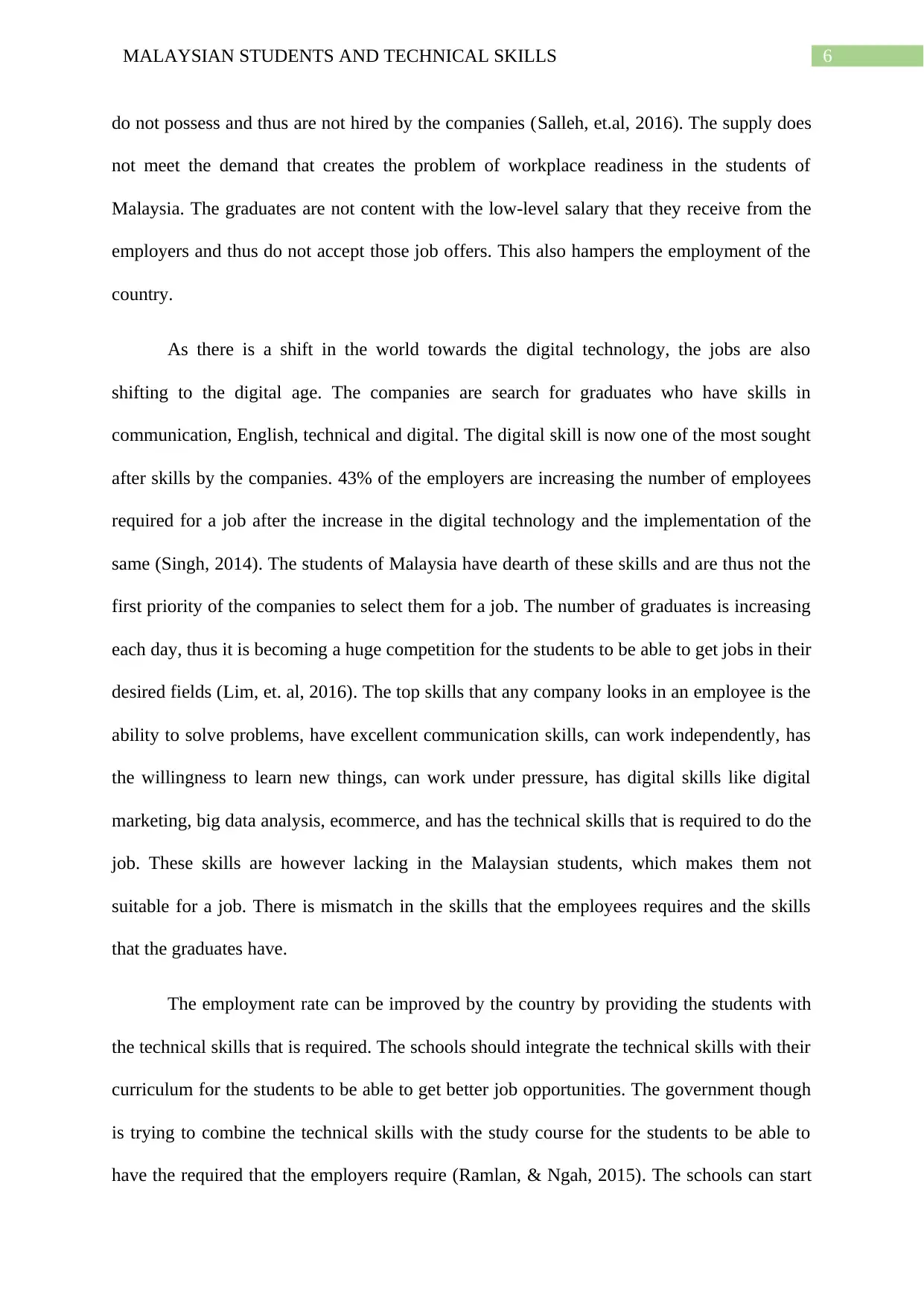
6MALAYSIAN STUDENTS AND TECHNICAL SKILLS
do not possess and thus are not hired by the companies (Salleh, et.al, 2016). The supply does
not meet the demand that creates the problem of workplace readiness in the students of
Malaysia. The graduates are not content with the low-level salary that they receive from the
employers and thus do not accept those job offers. This also hampers the employment of the
country.
As there is a shift in the world towards the digital technology, the jobs are also
shifting to the digital age. The companies are search for graduates who have skills in
communication, English, technical and digital. The digital skill is now one of the most sought
after skills by the companies. 43% of the employers are increasing the number of employees
required for a job after the increase in the digital technology and the implementation of the
same (Singh, 2014). The students of Malaysia have dearth of these skills and are thus not the
first priority of the companies to select them for a job. The number of graduates is increasing
each day, thus it is becoming a huge competition for the students to be able to get jobs in their
desired fields (Lim, et. al, 2016). The top skills that any company looks in an employee is the
ability to solve problems, have excellent communication skills, can work independently, has
the willingness to learn new things, can work under pressure, has digital skills like digital
marketing, big data analysis, ecommerce, and has the technical skills that is required to do the
job. These skills are however lacking in the Malaysian students, which makes them not
suitable for a job. There is mismatch in the skills that the employees requires and the skills
that the graduates have.
The employment rate can be improved by the country by providing the students with
the technical skills that is required. The schools should integrate the technical skills with their
curriculum for the students to be able to get better job opportunities. The government though
is trying to combine the technical skills with the study course for the students to be able to
have the required that the employers require (Ramlan, & Ngah, 2015). The schools can start
do not possess and thus are not hired by the companies (Salleh, et.al, 2016). The supply does
not meet the demand that creates the problem of workplace readiness in the students of
Malaysia. The graduates are not content with the low-level salary that they receive from the
employers and thus do not accept those job offers. This also hampers the employment of the
country.
As there is a shift in the world towards the digital technology, the jobs are also
shifting to the digital age. The companies are search for graduates who have skills in
communication, English, technical and digital. The digital skill is now one of the most sought
after skills by the companies. 43% of the employers are increasing the number of employees
required for a job after the increase in the digital technology and the implementation of the
same (Singh, 2014). The students of Malaysia have dearth of these skills and are thus not the
first priority of the companies to select them for a job. The number of graduates is increasing
each day, thus it is becoming a huge competition for the students to be able to get jobs in their
desired fields (Lim, et. al, 2016). The top skills that any company looks in an employee is the
ability to solve problems, have excellent communication skills, can work independently, has
the willingness to learn new things, can work under pressure, has digital skills like digital
marketing, big data analysis, ecommerce, and has the technical skills that is required to do the
job. These skills are however lacking in the Malaysian students, which makes them not
suitable for a job. There is mismatch in the skills that the employees requires and the skills
that the graduates have.
The employment rate can be improved by the country by providing the students with
the technical skills that is required. The schools should integrate the technical skills with their
curriculum for the students to be able to get better job opportunities. The government though
is trying to combine the technical skills with the study course for the students to be able to
have the required that the employers require (Ramlan, & Ngah, 2015). The schools can start
Paraphrase This Document
Need a fresh take? Get an instant paraphrase of this document with our AI Paraphraser
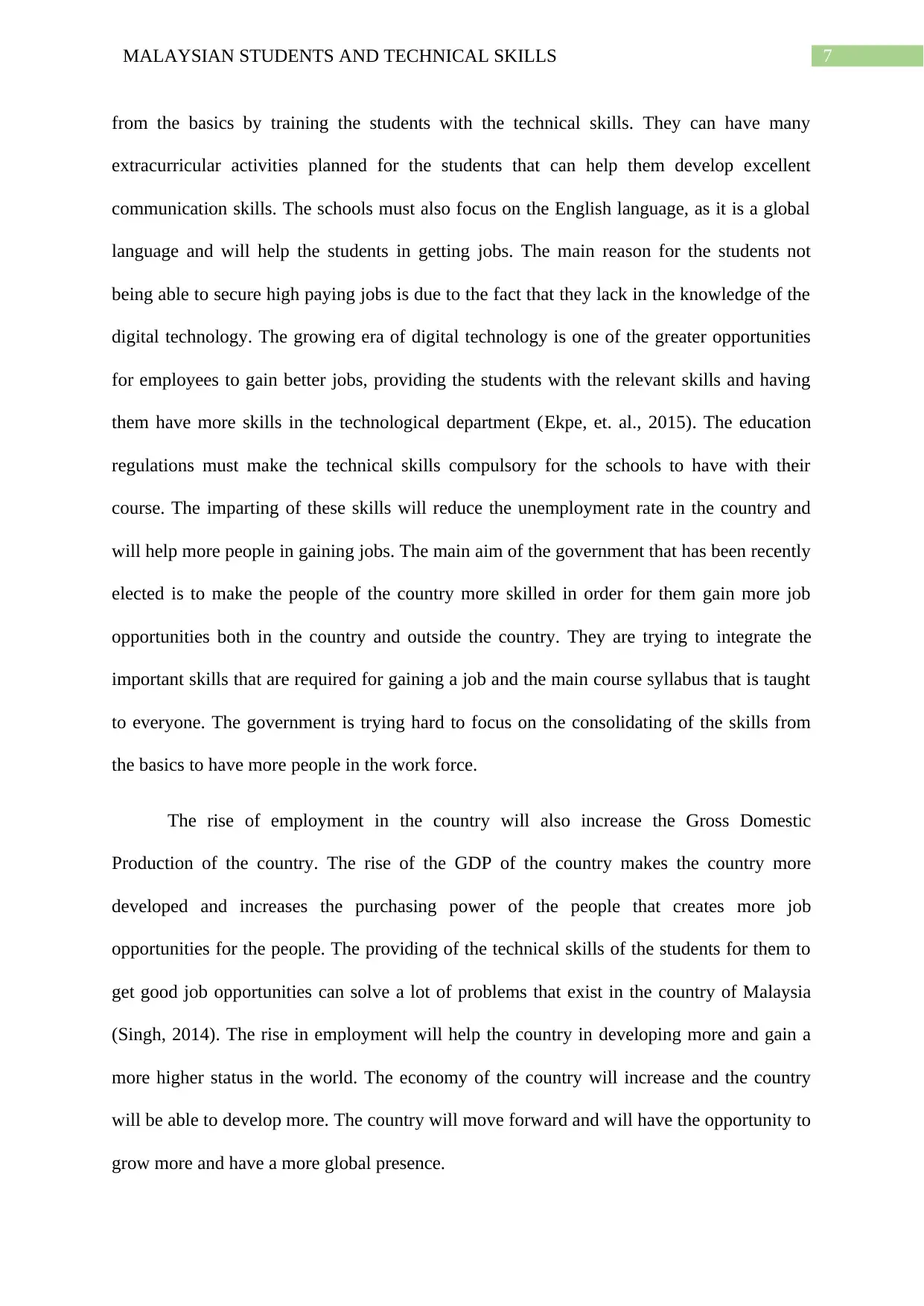
7MALAYSIAN STUDENTS AND TECHNICAL SKILLS
from the basics by training the students with the technical skills. They can have many
extracurricular activities planned for the students that can help them develop excellent
communication skills. The schools must also focus on the English language, as it is a global
language and will help the students in getting jobs. The main reason for the students not
being able to secure high paying jobs is due to the fact that they lack in the knowledge of the
digital technology. The growing era of digital technology is one of the greater opportunities
for employees to gain better jobs, providing the students with the relevant skills and having
them have more skills in the technological department (Ekpe, et. al., 2015). The education
regulations must make the technical skills compulsory for the schools to have with their
course. The imparting of these skills will reduce the unemployment rate in the country and
will help more people in gaining jobs. The main aim of the government that has been recently
elected is to make the people of the country more skilled in order for them gain more job
opportunities both in the country and outside the country. They are trying to integrate the
important skills that are required for gaining a job and the main course syllabus that is taught
to everyone. The government is trying hard to focus on the consolidating of the skills from
the basics to have more people in the work force.
The rise of employment in the country will also increase the Gross Domestic
Production of the country. The rise of the GDP of the country makes the country more
developed and increases the purchasing power of the people that creates more job
opportunities for the people. The providing of the technical skills of the students for them to
get good job opportunities can solve a lot of problems that exist in the country of Malaysia
(Singh, 2014). The rise in employment will help the country in developing more and gain a
more higher status in the world. The economy of the country will increase and the country
will be able to develop more. The country will move forward and will have the opportunity to
grow more and have a more global presence.
from the basics by training the students with the technical skills. They can have many
extracurricular activities planned for the students that can help them develop excellent
communication skills. The schools must also focus on the English language, as it is a global
language and will help the students in getting jobs. The main reason for the students not
being able to secure high paying jobs is due to the fact that they lack in the knowledge of the
digital technology. The growing era of digital technology is one of the greater opportunities
for employees to gain better jobs, providing the students with the relevant skills and having
them have more skills in the technological department (Ekpe, et. al., 2015). The education
regulations must make the technical skills compulsory for the schools to have with their
course. The imparting of these skills will reduce the unemployment rate in the country and
will help more people in gaining jobs. The main aim of the government that has been recently
elected is to make the people of the country more skilled in order for them gain more job
opportunities both in the country and outside the country. They are trying to integrate the
important skills that are required for gaining a job and the main course syllabus that is taught
to everyone. The government is trying hard to focus on the consolidating of the skills from
the basics to have more people in the work force.
The rise of employment in the country will also increase the Gross Domestic
Production of the country. The rise of the GDP of the country makes the country more
developed and increases the purchasing power of the people that creates more job
opportunities for the people. The providing of the technical skills of the students for them to
get good job opportunities can solve a lot of problems that exist in the country of Malaysia
(Singh, 2014). The rise in employment will help the country in developing more and gain a
more higher status in the world. The economy of the country will increase and the country
will be able to develop more. The country will move forward and will have the opportunity to
grow more and have a more global presence.
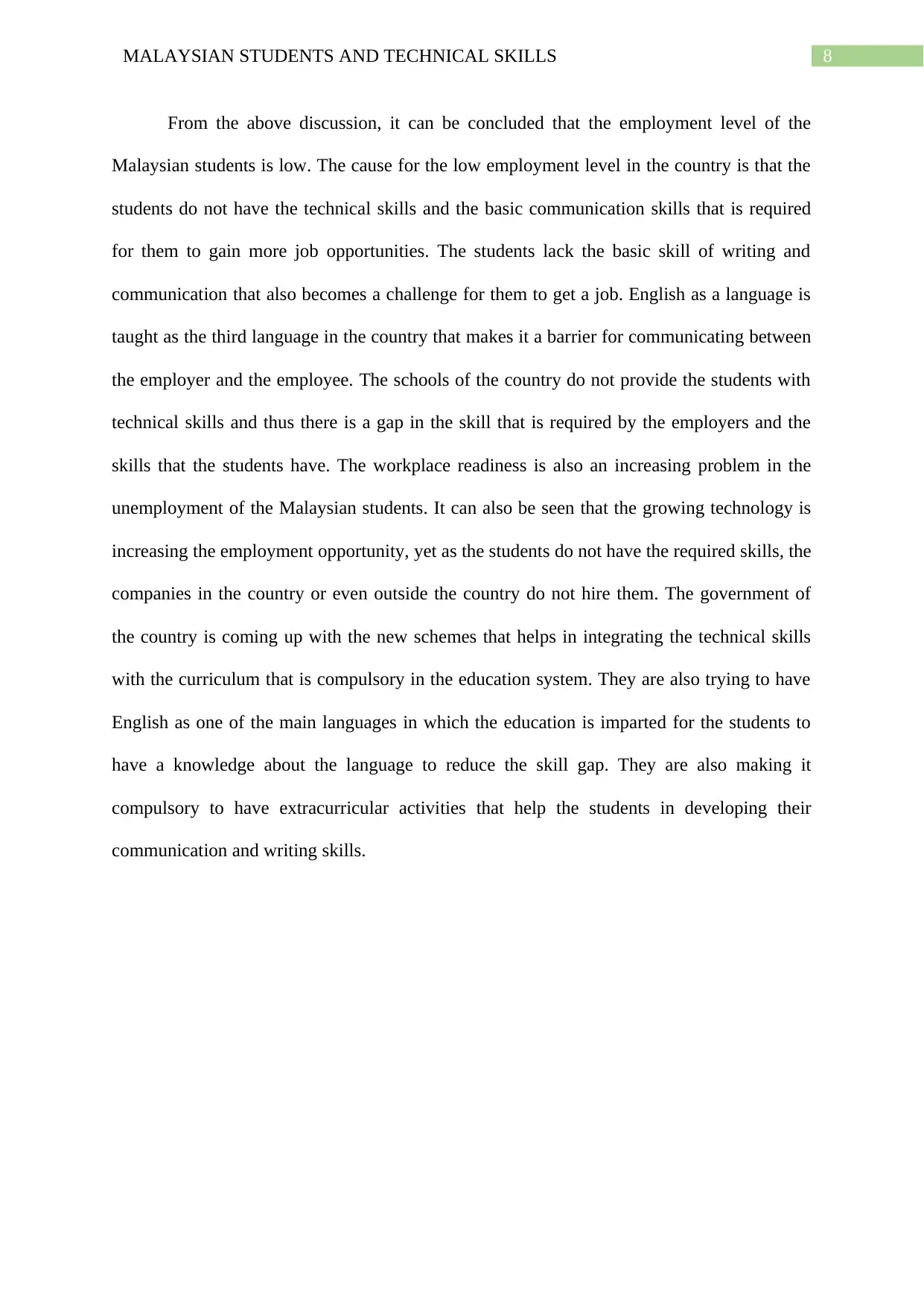
8MALAYSIAN STUDENTS AND TECHNICAL SKILLS
From the above discussion, it can be concluded that the employment level of the
Malaysian students is low. The cause for the low employment level in the country is that the
students do not have the technical skills and the basic communication skills that is required
for them to gain more job opportunities. The students lack the basic skill of writing and
communication that also becomes a challenge for them to get a job. English as a language is
taught as the third language in the country that makes it a barrier for communicating between
the employer and the employee. The schools of the country do not provide the students with
technical skills and thus there is a gap in the skill that is required by the employers and the
skills that the students have. The workplace readiness is also an increasing problem in the
unemployment of the Malaysian students. It can also be seen that the growing technology is
increasing the employment opportunity, yet as the students do not have the required skills, the
companies in the country or even outside the country do not hire them. The government of
the country is coming up with the new schemes that helps in integrating the technical skills
with the curriculum that is compulsory in the education system. They are also trying to have
English as one of the main languages in which the education is imparted for the students to
have a knowledge about the language to reduce the skill gap. They are also making it
compulsory to have extracurricular activities that help the students in developing their
communication and writing skills.
From the above discussion, it can be concluded that the employment level of the
Malaysian students is low. The cause for the low employment level in the country is that the
students do not have the technical skills and the basic communication skills that is required
for them to gain more job opportunities. The students lack the basic skill of writing and
communication that also becomes a challenge for them to get a job. English as a language is
taught as the third language in the country that makes it a barrier for communicating between
the employer and the employee. The schools of the country do not provide the students with
technical skills and thus there is a gap in the skill that is required by the employers and the
skills that the students have. The workplace readiness is also an increasing problem in the
unemployment of the Malaysian students. It can also be seen that the growing technology is
increasing the employment opportunity, yet as the students do not have the required skills, the
companies in the country or even outside the country do not hire them. The government of
the country is coming up with the new schemes that helps in integrating the technical skills
with the curriculum that is compulsory in the education system. They are also trying to have
English as one of the main languages in which the education is imparted for the students to
have a knowledge about the language to reduce the skill gap. They are also making it
compulsory to have extracurricular activities that help the students in developing their
communication and writing skills.
⊘ This is a preview!⊘
Do you want full access?
Subscribe today to unlock all pages.

Trusted by 1+ million students worldwide
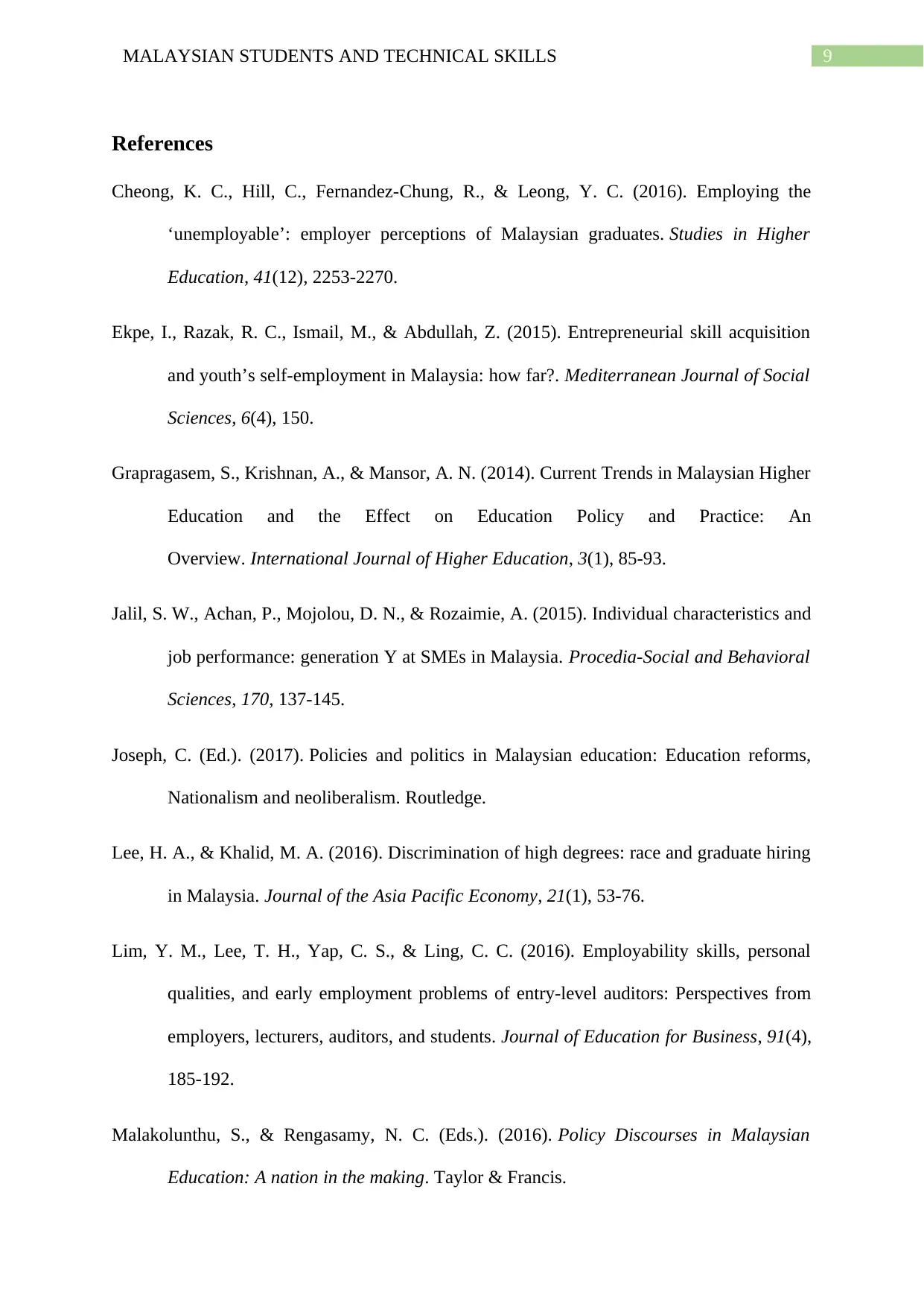
9MALAYSIAN STUDENTS AND TECHNICAL SKILLS
References
Cheong, K. C., Hill, C., Fernandez-Chung, R., & Leong, Y. C. (2016). Employing the
‘unemployable’: employer perceptions of Malaysian graduates. Studies in Higher
Education, 41(12), 2253-2270.
Ekpe, I., Razak, R. C., Ismail, M., & Abdullah, Z. (2015). Entrepreneurial skill acquisition
and youth’s self-employment in Malaysia: how far?. Mediterranean Journal of Social
Sciences, 6(4), 150.
Grapragasem, S., Krishnan, A., & Mansor, A. N. (2014). Current Trends in Malaysian Higher
Education and the Effect on Education Policy and Practice: An
Overview. International Journal of Higher Education, 3(1), 85-93.
Jalil, S. W., Achan, P., Mojolou, D. N., & Rozaimie, A. (2015). Individual characteristics and
job performance: generation Y at SMEs in Malaysia. Procedia-Social and Behavioral
Sciences, 170, 137-145.
Joseph, C. (Ed.). (2017). Policies and politics in Malaysian education: Education reforms,
Nationalism and neoliberalism. Routledge.
Lee, H. A., & Khalid, M. A. (2016). Discrimination of high degrees: race and graduate hiring
in Malaysia. Journal of the Asia Pacific Economy, 21(1), 53-76.
Lim, Y. M., Lee, T. H., Yap, C. S., & Ling, C. C. (2016). Employability skills, personal
qualities, and early employment problems of entry-level auditors: Perspectives from
employers, lecturers, auditors, and students. Journal of Education for Business, 91(4),
185-192.
Malakolunthu, S., & Rengasamy, N. C. (Eds.). (2016). Policy Discourses in Malaysian
Education: A nation in the making. Taylor & Francis.
References
Cheong, K. C., Hill, C., Fernandez-Chung, R., & Leong, Y. C. (2016). Employing the
‘unemployable’: employer perceptions of Malaysian graduates. Studies in Higher
Education, 41(12), 2253-2270.
Ekpe, I., Razak, R. C., Ismail, M., & Abdullah, Z. (2015). Entrepreneurial skill acquisition
and youth’s self-employment in Malaysia: how far?. Mediterranean Journal of Social
Sciences, 6(4), 150.
Grapragasem, S., Krishnan, A., & Mansor, A. N. (2014). Current Trends in Malaysian Higher
Education and the Effect on Education Policy and Practice: An
Overview. International Journal of Higher Education, 3(1), 85-93.
Jalil, S. W., Achan, P., Mojolou, D. N., & Rozaimie, A. (2015). Individual characteristics and
job performance: generation Y at SMEs in Malaysia. Procedia-Social and Behavioral
Sciences, 170, 137-145.
Joseph, C. (Ed.). (2017). Policies and politics in Malaysian education: Education reforms,
Nationalism and neoliberalism. Routledge.
Lee, H. A., & Khalid, M. A. (2016). Discrimination of high degrees: race and graduate hiring
in Malaysia. Journal of the Asia Pacific Economy, 21(1), 53-76.
Lim, Y. M., Lee, T. H., Yap, C. S., & Ling, C. C. (2016). Employability skills, personal
qualities, and early employment problems of entry-level auditors: Perspectives from
employers, lecturers, auditors, and students. Journal of Education for Business, 91(4),
185-192.
Malakolunthu, S., & Rengasamy, N. C. (Eds.). (2016). Policy Discourses in Malaysian
Education: A nation in the making. Taylor & Francis.
Paraphrase This Document
Need a fresh take? Get an instant paraphrase of this document with our AI Paraphraser
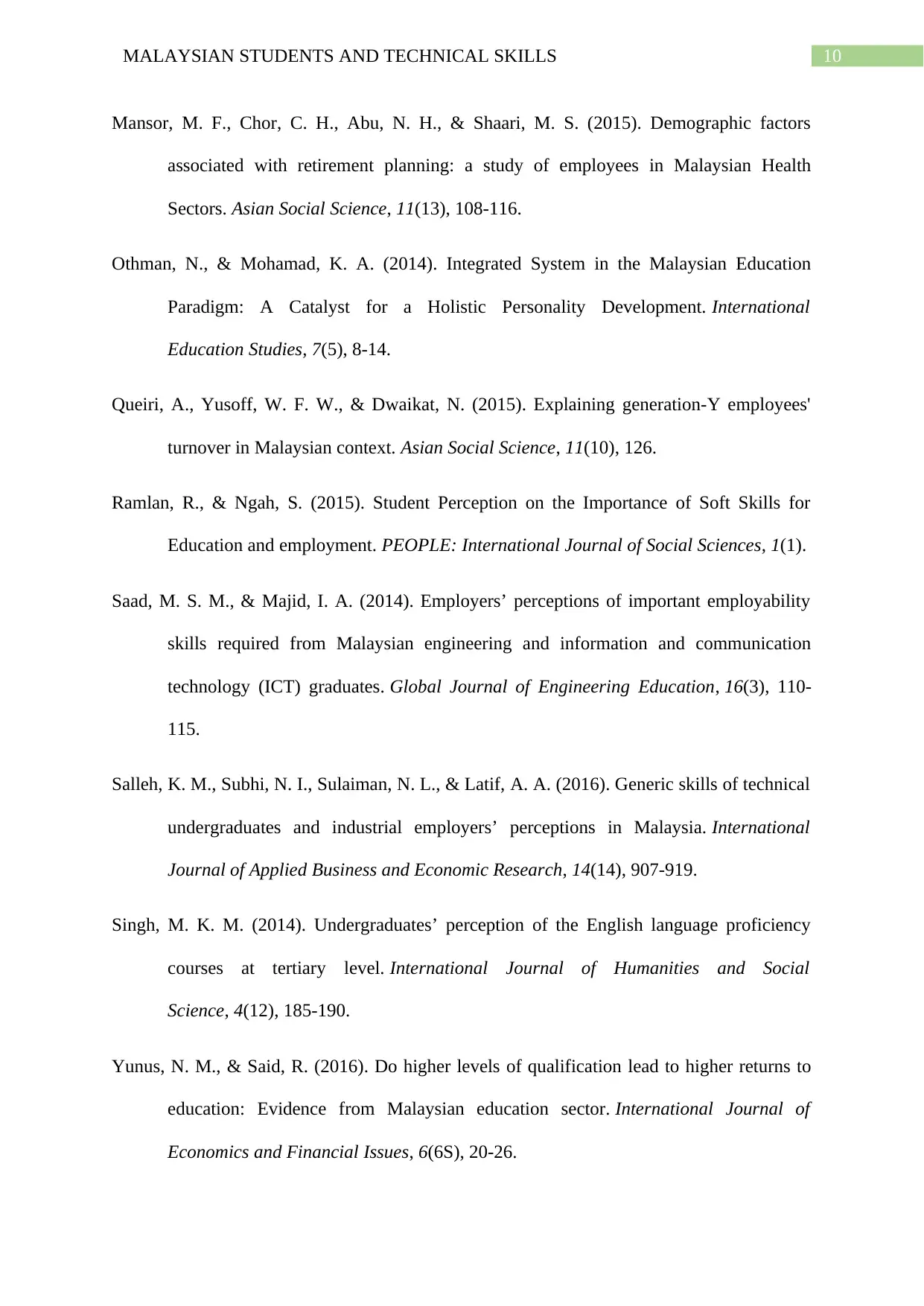
10MALAYSIAN STUDENTS AND TECHNICAL SKILLS
Mansor, M. F., Chor, C. H., Abu, N. H., & Shaari, M. S. (2015). Demographic factors
associated with retirement planning: a study of employees in Malaysian Health
Sectors. Asian Social Science, 11(13), 108-116.
Othman, N., & Mohamad, K. A. (2014). Integrated System in the Malaysian Education
Paradigm: A Catalyst for a Holistic Personality Development. International
Education Studies, 7(5), 8-14.
Queiri, A., Yusoff, W. F. W., & Dwaikat, N. (2015). Explaining generation-Y employees'
turnover in Malaysian context. Asian Social Science, 11(10), 126.
Ramlan, R., & Ngah, S. (2015). Student Perception on the Importance of Soft Skills for
Education and employment. PEOPLE: International Journal of Social Sciences, 1(1).
Saad, M. S. M., & Majid, I. A. (2014). Employers’ perceptions of important employability
skills required from Malaysian engineering and information and communication
technology (ICT) graduates. Global Journal of Engineering Education, 16(3), 110-
115.
Salleh, K. M., Subhi, N. I., Sulaiman, N. L., & Latif, A. A. (2016). Generic skills of technical
undergraduates and industrial employers’ perceptions in Malaysia. International
Journal of Applied Business and Economic Research, 14(14), 907-919.
Singh, M. K. M. (2014). Undergraduates’ perception of the English language proficiency
courses at tertiary level. International Journal of Humanities and Social
Science, 4(12), 185-190.
Yunus, N. M., & Said, R. (2016). Do higher levels of qualification lead to higher returns to
education: Evidence from Malaysian education sector. International Journal of
Economics and Financial Issues, 6(6S), 20-26.
Mansor, M. F., Chor, C. H., Abu, N. H., & Shaari, M. S. (2015). Demographic factors
associated with retirement planning: a study of employees in Malaysian Health
Sectors. Asian Social Science, 11(13), 108-116.
Othman, N., & Mohamad, K. A. (2014). Integrated System in the Malaysian Education
Paradigm: A Catalyst for a Holistic Personality Development. International
Education Studies, 7(5), 8-14.
Queiri, A., Yusoff, W. F. W., & Dwaikat, N. (2015). Explaining generation-Y employees'
turnover in Malaysian context. Asian Social Science, 11(10), 126.
Ramlan, R., & Ngah, S. (2015). Student Perception on the Importance of Soft Skills for
Education and employment. PEOPLE: International Journal of Social Sciences, 1(1).
Saad, M. S. M., & Majid, I. A. (2014). Employers’ perceptions of important employability
skills required from Malaysian engineering and information and communication
technology (ICT) graduates. Global Journal of Engineering Education, 16(3), 110-
115.
Salleh, K. M., Subhi, N. I., Sulaiman, N. L., & Latif, A. A. (2016). Generic skills of technical
undergraduates and industrial employers’ perceptions in Malaysia. International
Journal of Applied Business and Economic Research, 14(14), 907-919.
Singh, M. K. M. (2014). Undergraduates’ perception of the English language proficiency
courses at tertiary level. International Journal of Humanities and Social
Science, 4(12), 185-190.
Yunus, N. M., & Said, R. (2016). Do higher levels of qualification lead to higher returns to
education: Evidence from Malaysian education sector. International Journal of
Economics and Financial Issues, 6(6S), 20-26.
1 out of 11
Related Documents
Your All-in-One AI-Powered Toolkit for Academic Success.
+13062052269
info@desklib.com
Available 24*7 on WhatsApp / Email
![[object Object]](/_next/static/media/star-bottom.7253800d.svg)
Unlock your academic potential
Copyright © 2020–2026 A2Z Services. All Rights Reserved. Developed and managed by ZUCOL.





